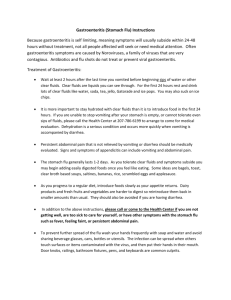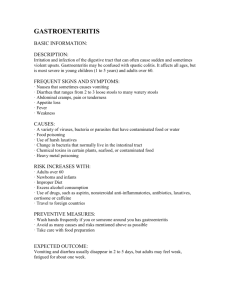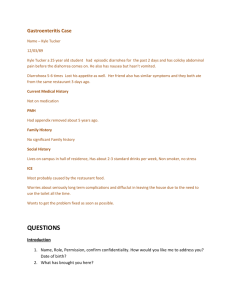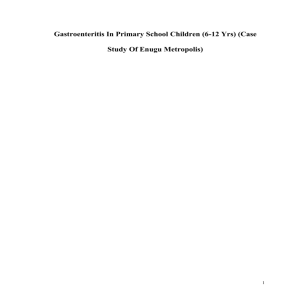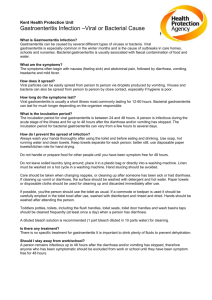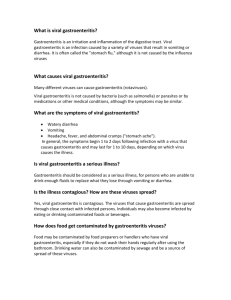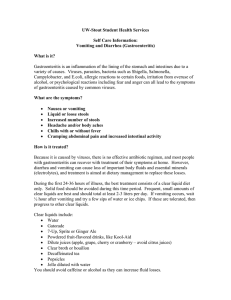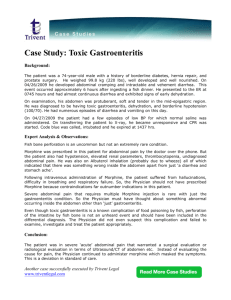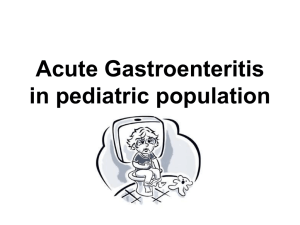“Stomach Flu” - Gastroenteritis
advertisement
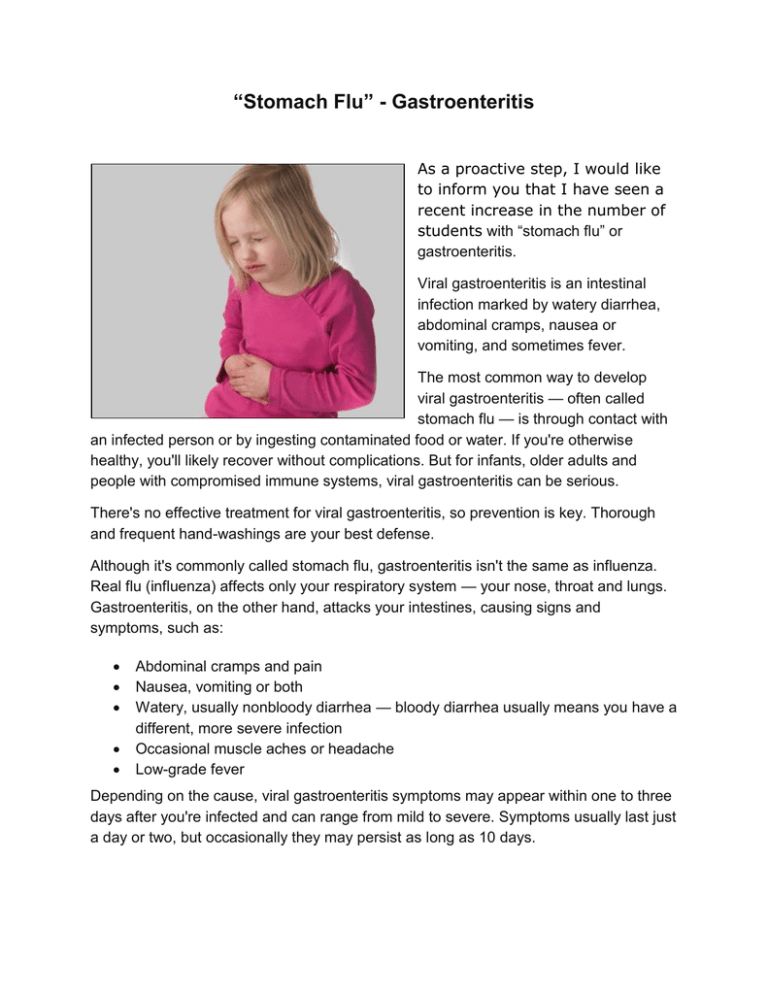
“Stomach Flu” - Gastroenteritis As a proactive step, I would like to inform you that I have seen a recent increase in the number of students with “stomach flu” or gastroenteritis. Viral gastroenteritis is an intestinal infection marked by watery diarrhea, abdominal cramps, nausea or vomiting, and sometimes fever. The most common way to develop viral gastroenteritis — often called stomach flu — is through contact with an infected person or by ingesting contaminated food or water. If you're otherwise healthy, you'll likely recover without complications. But for infants, older adults and people with compromised immune systems, viral gastroenteritis can be serious. There's no effective treatment for viral gastroenteritis, so prevention is key. Thorough and frequent hand-washings are your best defense. Although it's commonly called stomach flu, gastroenteritis isn't the same as influenza. Real flu (influenza) affects only your respiratory system — your nose, throat and lungs. Gastroenteritis, on the other hand, attacks your intestines, causing signs and symptoms, such as: Abdominal cramps and pain Nausea, vomiting or both Watery, usually nonbloody diarrhea — bloody diarrhea usually means you have a different, more severe infection Occasional muscle aches or headache Low-grade fever Depending on the cause, viral gastroenteritis symptoms may appear within one to three days after you're infected and can range from mild to severe. Symptoms usually last just a day or two, but occasionally they may persist as long as 10 days. When to see a doctor If you're an adult, call your doctor if: You're not able to keep liquids down for 24 hours You've been vomiting for more than two days You're vomiting blood You're dehydrated — signs of dehydration include excessive thirst, dry mouth, deep yellow urine or little or no urine, and severe weakness, dizziness or lightheadedness You notice blood in your bowel movements You have a fever above 104 F (40 C) For infants and children See your doctor right away if your child: Has a fever of 102 F (38.9 C) or higher Seems lethargic or very irritable Is in a lot of discomfort or pain Has bloody diarrhea Seems dehydrated — watch for signs of dehydration in sick infants and children by comparing how much they drink and urinate with how much is normal for them A number of viruses can cause gastroenteritis, including: Noroviruses. Both children and adults are affected by noroviruses, the most common cause of foodborne illness worldwide. Norovirus infection can sweep through families and communities. It's especially likely to spread among people in confined spaces. In most cases, you pick up the virus from contaminated food or water, although person-to-person transmission also is possible. Rotavirus. Worldwide, this is the most common cause of viral gastroenteritis in children, who are usually infected when they put their fingers or other objects contaminated with the virus into their mouths. The infection is most severe in infants and young children. Adults infected with rotavirus may not have symptoms, but can still spread the illness — of particular concern in institutional settings because infected adults unknowingly can pass the virus to others. A vaccine against viral gastroenteritis is available in some countries, including the United States, and appears to be effective in preventing the infection. Treatments There's often no specific medical treatment for viral gastroenteritis. Antibiotics aren't effective against viruses, and overusing them can contribute to the development of antibiotic-resistant strains of bacteria. Treatment initially consists of self-care measures. To help keep yourself more comfortable and prevent dehydration while you recover, try the following: Let your stomach settle. Stop eating solid foods for a few hours. Try sucking on ice chips or taking small sips of water. You might also try drinking clear soda, clear broths or noncaffeinated sports drinks. Drink plenty of liquid every day, taking small, frequent sips. Ease back into eating. Gradually begin to eat bland, easy-to-digest foods, such as soda crackers, toast, gelatin, bananas, rice and chicken. Stop eating if your nausea returns. Avoid certain foods and substances until you feel better. These include dairy products, caffeine, alcohol, nicotine, and fatty or highly seasoned foods. Get plenty of rest. The illness and dehydration may have made you weak and tired. Be cautious with medications. Use many medications, such as ibuprofen (Advil, Motrin IB, others), sparingly if at all. They can make your stomach more upset. Use acetaminophen (Tylenol, others) cautiously; it sometimes can cause liver toxicity, especially in children. Don't give aspirin to children or teens because of the risk of Reye's syndrome, a rare, but potentially fatal disease. Before choosing a pain reliever or fever reducer discuss with your child's pediatrician. For infants and children When your child has an intestinal infection, the most important goal is to replace lost fluids and salts. These suggestions may help: Help your child rehydrate. Give your child an oral rehydration solution, available at pharmacies without a prescription. Talk to your doctor if you have questions about how to use it. Don't give your child plain water — in children with gastroenteritis, water isn't absorbed well and won't adequately replace lost electrolytes. Avoid giving your child apple juice for rehydration — it can make diarrhea worse. Get your child back to a normal diet slowly. Gradually introduce bland, easyto-digest foods, such as toast, rice, bananas and potatoes. Avoid certain foods. Don't give your child dairy products or sugary foods, such as ice cream, sodas and candy. These can make diarrhea worse. Make sure your child gets plenty of rest. The illness and dehydration may have made your child weak and tired. Avoid giving your child over-the-counter anti-diarrheal medications, unless advised by your doctor. They can make it harder for your child's body to eliminate the virus. Prevention The best way to prevent the spread of intestinal infections is to follow these precautions: Wash your hands thoroughly. And make sure your children do, too. If your children are older, teach them to wash their hands, especially after using the toilet. It's best to use warm water and soap and to rub hands vigorously for at least 20 seconds, remembering to wash around cuticles, beneath fingernails and in the creases of the hands. Then rinse thoroughly. Carry towelettes and hand sanitizer for times when soap and water aren't available. Use separate personal items around your home. Avoid sharing eating utensils, glasses and plates. Use separate towels in the bathroom. Keep your distance. Avoid close contact with anyone who has the virus, if possible. Disinfect hard surfaces. If someone in your home has viral gastroenteritis, disinfect hard surfaces, such as counters, faucets and doorknobs, with a mixture of two cups of bleach to one gallon of water.
